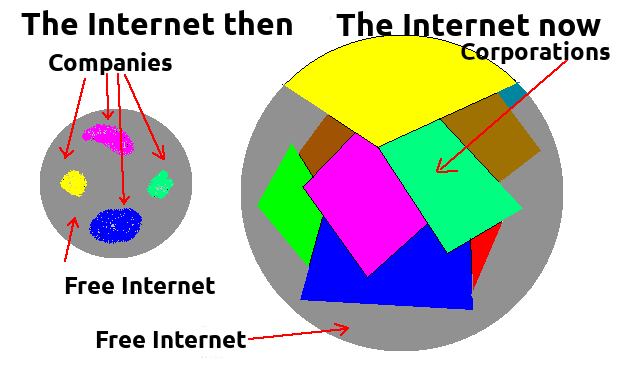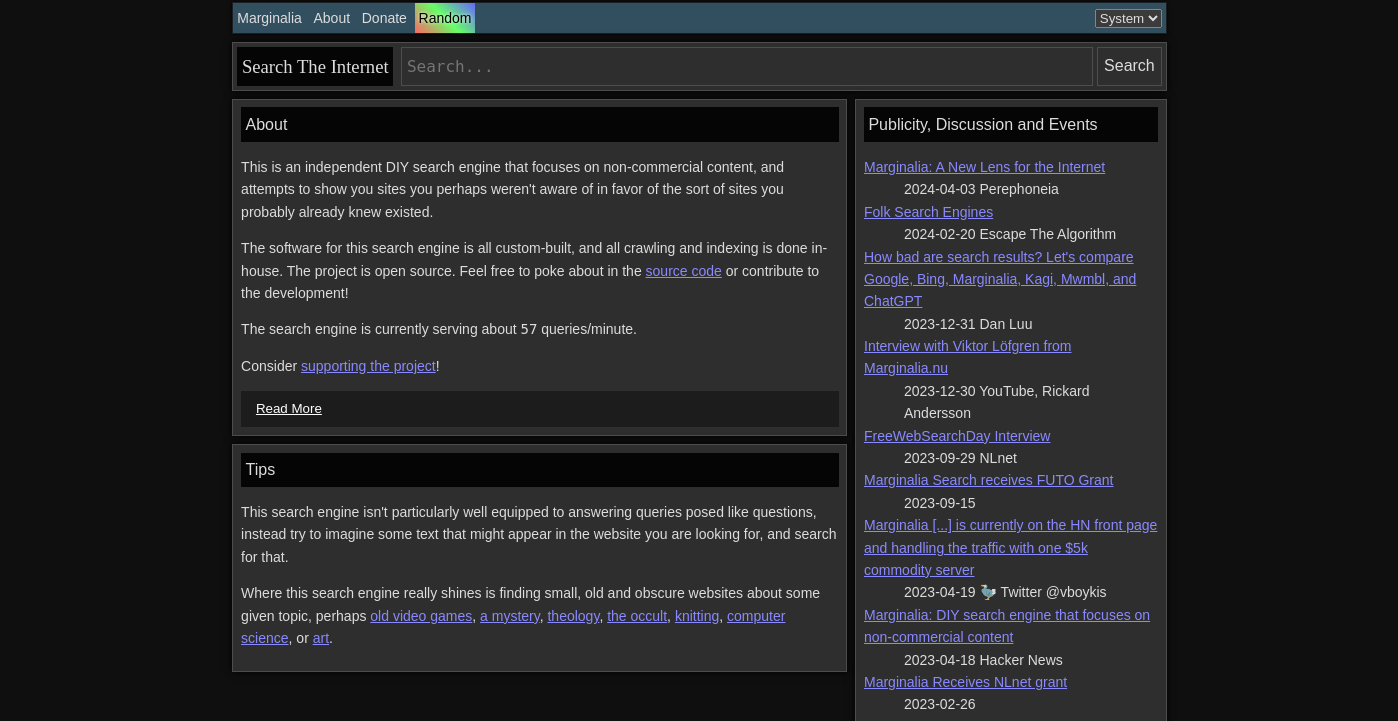The Free Web

A Manifesto
Web Renaissance, Web Revival, Small-Web, Retro Web, Indie Web, Personal Web, Web0, Web 3.0...
What's this all about anyway?
I never had a personal website in the old web. Even though I did grow up in a passing awareness of it, I never really took part in it. Not enough to say that I miss it. It's more like a longing for something that I never had, that most likely is somewhat idealized in my mind. But isn't that how things work all the time? Things get lost and brought back, and the thing that comes back is not quite the thing that was lost but something similar in spirit at least, if we are lucky.
I do remember growing up in the times of AOL and the World Wide Web. The first internet service my parents hired actually came with a map of the internet, showing every site known to man —probably not, but it was meant to give you that impression— and how they linked to each other. But I was probably 8 or so then, even if it looked somewhat intriguing, I didn't really make much use of it.
I remember watching some cartoon and there was a url in the bottom of the screen during the opening credits, so we rushed to write it down, and then later connected to the internet and went to the site to see a page about the show.
I remember when my big brother's friend came home and had a url written down in a piece of paper, so we went to the computer, connected to the internet, typed the url, and the computer took about 5 minutes to load a rather inappropriate picture from a comic book we were keen on. We all laughed, promptly made sure my parents weren't around, closed the site and never saw it again.
Then I remember the search engines before Google too. Altavista for a time was the king and it barely even gets mentioned today, and Yahoo. Though mostly I just used them to do homework.
I never had MySpace but I had Hi5, kind of the younger dorky, unpopular, brother of MySpace. In highschool I used to spend whole afternoons, sometimes late nights, chatting with my friends on Messenger. And then came Facebook; I was a late adopter but for me that is when web2.0 started, in the sense that the Internet became a place that revolved around just a few different websites: Facebook, Google, Youtube, and that's it.
Of course, there were downsides to it as well. Like it was much less secure in many ways, or every other search in the original search engines yielded nothing but porn.
Is it all just nostalgia? Is it about the retro design, the gifs, the bland colors, glitchy pixelated graphics?
Is it about being anti-corporate, anti-capitalist —what's Capitalism anyway?
Is it about owning your data? Do you really own your data when it's hosted on Neocities, o even when it's hosted on another “private” server that you rent, for that matter?
Is it about expression, freedom, decentralization?
It's hard to describe it but it feels like there was something freer about the old web. Even for those of us that only experienced it at a distance. I think a big part of it was anonymity. In the ye olden days of web 1.0 most the services that were common then like IRC chats, forums and RSS, didn't even ask you to register with an email account. You just picked a nickname and a password and used them. Or not even that, you could (still can but it's not that common) follow a site's updates using their rss feed instead of having to "subscribe to our newsletter" by giving them all your information just so that they can send you endless spam marketing emails and the occasional useful article.
It wasn't exactly user-friendly, you know. It hasn't gotten any harder to own and program your own website, in fact it's gotten a million times easier to rent a server and upload your website, there's a ton of free resources to learn HTML, CSS, Javascript and other technologies to create all kinds of websites, for free, available on the internet; there are static site generators that you can use to drag-and-drop your content on pre-designed themes.
The only thing that may have gotten harder is to host your website on your own server and that's because the internet has grown so much that now ISP companies are using something called a CGNAT, which in layman's terms means that you don't have your own public IP so you don't communicate directly to the open web. But who was even doing that before anyway? Only geeks and tech savvy people.
But in a certain sense it's true that there was more freedom, if we understand that freedom doesn't mean easy, or even accessible, it just means that there are less boundaries.
Let me explain with my own little crappy graphic:

In the ye olden days of Web1.0 it felt like the internet was a Wild West kind of place, there were proportionally less companies, and more “free internet” websites: personal websites (that doesn't just mean that it's “about me”, it could be a website dedicated to some hobby, or a group, or some topic, but created and maintained by one person or a small group with a common interest). I would also place here many small companies that would create their own website internally, without hiring professional web-design services. There were some big companies, but nowhere near as big as the ones we see now. And another thing is that the boundaries between the company owned internet and the “free” internet felt less rigid, more fuzzy.
In the new internet of Web2.0 it feels like everything is an app or a corporation and also the boundaries are much more solid. In reality, the “free” space is still there, even much larger because guess what, web hosting is also a lucrative business and web hosting companies are making sure that their services are more accessible than ever.
But the reason that it felt so different is because nowadays the vast majority of users inhabit the corporate space almost exclusively, and that is also where Google operates. Whereas in the past more users, proportionally, would inhabit the free and open web, even websites that were the precursors to Web2.0 like MySpace were mostly niche —I only ever knew two or three people who used it—, most of us would just surf the open web and share URLs freely.
By the way, did you know there is a search engine for the small web? It's called Marginalia, check it out.

And the reason that the boundaries feel more rigid is because these huge corporations design their websites like walled gardens so that you don't feel the need to go outside, so you can spend hours on end mindlessly scrolling through their “user generated” content, from one micro-dose of dopamine to the next without even looking outside. They provide a platform for you to create and publish your content with hardly any customization allowed. So you generate the content for their website, make their website grow, they get all the traffic and all your data and you get a little entertainment (and anxiety). Is it actually a free service or are you working for them?
The other big part is decentralization. I think Facebook (Meta) and Google (Alphabet) together probably own something like 90% of internet traffic (don't quote me on that). Both try actively to be more that just a website, they try to be THE internet.
The internet used to feel like a bigger place, not because there was more in it, but because you wouldn't spend all the time on a single site, instead you would jump from one site to another one that had nothing to do with the first. Each site's content, design, structure, could be radically different from one another, now it seems like even independent sites all look and feel exactly the same.
But the open web is still there, it's just... hidden, maybe, more like out of sight.
If it were up to me, I'd like to call this thing “The Free Web”, because that's what it's about in my mind: the freedom and decentralization. And that can perfectly encompass all the other things too, if you want. "Indie Web" is an ok term too, I suppose.
But here's a bonus question: deep down, are we trying to create something new or to keep something alive? In other words, are we revolutionaries or conservatives? That's why I also like the concept of a Web Renaissance or Web Revival. A Renaissance is bringing back ideas that were once there —in a different form, to a new context, with modern tools—, that have been lost or perverted; not to bring them back exactly as they were, but their spirit in some way. Like saying we have lost our way, but it's not too late, we can still retrace our steps, find the right path and keep moving forward from there.
- Pablo S. G. Oct 2024
"Nel mezzo del cammin di nostra vita
mi ritrovai per una selva oscura,
ché la diritta via era smarrita."
- Dante